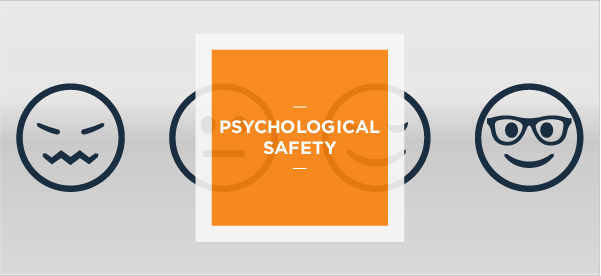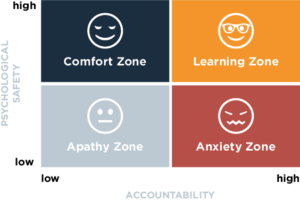“Psychological safety” is a term used to describe the safety in groups which allows the openness for sharing ideas and surfacing conflict. Although there is no OSHA-like agency that governs and monitors the safety of our emotions and feelings in the workplace, both contemporary leaders and generations of past leaders have valued psychological safety in a way history has yet to quantify.
Amy Edmondson is perhaps the leading researcher and author in this space, and you can find her TEDx talk on YouTube. In this talk, Edmondson makes the case that psychological safety increases learning and has a profound relationship to accountability – and the work we do with leaders and teams suggests many organizations are struggling in this area. That work, and especially our Team Forward process, focuses on developing intact teams so they may work more collectively with more focus to scale their leadership, resulting in getting more done with lower energetic costs. I’m not talking about your facility’s electric bill here … I am talking about the physical, mental, and emotional energy it takes for you and your people to run your business.
Psychological safety isn’t just about “being nice” or “soft stuff” like feelings; it’s an enveloping sensation of empowerment. You’ve felt it before, in a team or group that embraced your ideas, wanted to have you truly speak your mind and didn’t judge you for it … or maybe you haven’t. It turns out that most employees, according to employee engagement surveys with BLR, SHRM and Gallop, have not experienced this type of work environment.
Edmondson describes a quadrant model, a simple “x and y” graph where the x (or horizontal axis) goes from low to high accountability, and the y (or vertical axis) goes from low to high psychological safety. When both are low, she calls this the apathy zone; when both are high – the desired state – she calls this the learning or the high-performance zone. When psychological safety is high, but accountability is low, that’s the comfort zone where leaders fear too much comfort and not enough getting done; when accountability is high but psychological safety is low, there is widespread fear and anxiety.
Want a quick way to assess psychological safety in your workplace?
Ask your team to consider these 7 questions:
- If you make a mistake on your team, is it held against you?
- Are you able to bring up problems and tough issues?
- Do people on the team sometimes reject others for being different?
- Is it safe to take a risk?
- Is it difficult to ask other team members for help?
If you would like further guidance and development in this area of team and leadership development, reach out and let me know. I’d be thrilled to talk with you about your development strategies for 2022!
ps. you can also listen to Ralph Simone and Cindy Masingill discuss this topic in their podcast earlier this month.


Comments (2)
Hi, after reading this awesome piece of writing i
am too delighted to share my knowledge here with mates.
Thanks for reading and sharing Enrique!